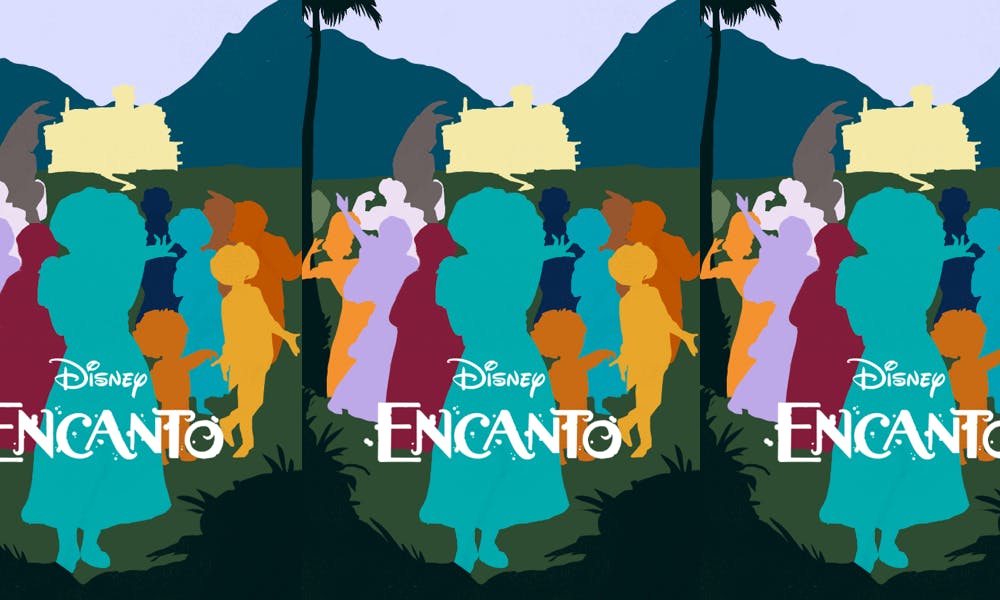(Ed. note: This article contains spoilers for 'Encanto.')
Tucked away in the beguiling mountains of Colombia, a vague, magical presence known as the Encanto protects the Madrigal family and has graced each child with an extraordinary gift. Encanto follows Mirabel (Stephanie Beatriz), the only child in the Madrigal family who did not receive a gift. But, as the magic of the Encanto begins to fade, Mirabel is the family’s only hope in saving their miracle.
The Madrigal family’s mystical origin begins with Mirabel’s Abuela, Alma Madrigal (María Cecilia Botero). Soon after giving birth to triplets, Alma and her husband Pedro are driven out of their village by corrupt Colombian soldiers, reminiscent of the real world civil corruption which has afflicted Colombian families for generations. During their escape, Pedro is killed defending his family. Immediately after his death, the Madrigal’s miracle occurs, magically driving off the soldiers. This miracle also bestows the children of the Madrigal family with supernatural gifts, such as super strength, shapeshifting, prophecy, and more.
With no gift of her own, Mirabel’s philosophy is to stay in the background and support her family as they succeed. As Abuela Alma makes it clear that the Madrigal family’s purpose is to use their gifts to help the village, Mirabel struggles knowing what her role is in the family. But when the family Casita begins to crack and the candle which holds the family’s miracle begins to fade, Mirabel must step up to save the magic. Mirabel embarks on a journey into her own family’s past in order to preserve the future of the Encanto.
What is immediately striking about Encanto is how different the story is from other animated films from Disney. Unlike many Disney films where the heroine must travel to distant lands to embark on her journey, Encanto almost entirely takes place in the Madrigal family home. In fact, the enchanted family home, Casita, takes on a life of its own as part of the family. Another stark contrast with previous films is the numerous members of the Madrigal family. Not only does Mirabel have two living parents, she is surrounded by sisters, cousins, and other extended family.
Besides the Madrigal family’s large size being unique to Encanto, the family dynamic is crucial to the plot of the film. As opposed to previous films where the heroine’s journey focuses on finding her prince charming or saving the day by defeating great forces beyond her control, the message behind Encanto is a simple one: protect the family. However, each member of the Madrigal family struggles with how they can use their gift to serve the good of the family.
Mirabel’s older sister Isabela (Diane Guerrero), is the golden child of the Madrigal family, much to Mirabel’s discontent. For much of the film, Isabela and Mirabel butt heads in a classic sibling rivalry. But, Isabela’s own internal struggle is revealed in her and Mirabel’s duet “What Else Can I Do?” Isabela reveals to Mirabel that although she seems to live a perfect, graceful life on the surface, this is not the life she wants to live. Caught up in the impossible expectations which come with the role of golden child, Isabela has put aside her own desires in order to serve the family. But, after Isabela and Mirabel’s reconciliation, Isabela allows herself to finally pursue her own path.
One of the major mysteries of Encanto surrounds Bruno, the estranged uncle of the Madrigal family. The family’s relationship with the mysterious uncle is made quite clear in the song “We Don’t Talk About Bruno.” Many viewers credit this as the most catchy song from Disney, dethroning Frozen’s “Let It Go.”
Bruno’s rift with his family stems from his ability to see the future. As Bruno uses his gift to warn others of the misfortunes he sees, the family and the village begin to associate Bruno with these grim events, even though he has no control over them. It’s revealed later in the film that Bruno never actually left the family: he went into hiding inside the walls of the Casita in order to spare the family from his prophecies.
For Abuela Alma, to protect the family means to protect the Encanto at all costs. This means to serve the community with hard work and dedication, making sure that each member of the family fulfills their role. These rules, which have governed the family for generations, have ensured the family’s safety for years—up until now. But Mirabel discovers that Alma’s rigid expectations of the family are causing the Encanto to disappear. It becomes clear that Mirabel’s lack of a gift was no accident—Mirabel’s destiny is to remind the Madrigal’s of the original purpose of the Encanto. In the end of the film, Mirabel is able to remind Alma of why the Encanto came to be to begin with, and together they rebuild their miracle.
The beauty of Encanto is how the film addresses real world issues that beset many families. With no clear villain, the film reveals that the antagonist can sometimes just be a lack of belief in oneself. By exploring themes such as estranged family members and unrealistic expectations, Encanto provides children with the foundation to navigate generational trauma. In a time with such deep divisions between generations, the film also advocates for intergenerational understanding. With incredible animation, masterful songwriting, and a timeless message, Encanto is just the kind of family film that our world needs.







